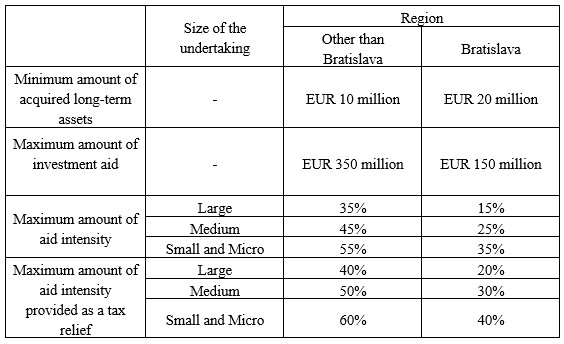Implementation of Temporary Crisis and Transition Framework in Slovakia: Gateway for State Aid Subsidies to Investors Involved i
Slovakia is about to implement a state aid scheme to support investments
in the production of equipment necessary for the net-zero economy
transition such as batteries, solar panels, wind turbines, heat-pumps,
electrolysers and equipment for capture and storage of carbon dioxide.
Because much of Slovakia is designated an ''A'' region (with significantly increased state aid intensities), game changing opportunities have arisen for investors interested in the production of equipment necessary for the green transition. For the latest developments in the planned implementation of the Temporary Crisis and Transition Framework (TCTF) in Slovakia, follow this link to the main article.
Main Article
The European Commission adopted the Temporary Crisis Framework and then the Temporary Crisis and Transition Framework (TCTF) to mitigate the economic consequences caused by Russia's invasion and ongoing war with Ukraine. To this extent, the TCTF establishes a framework for several state aid mechanisms that allow EU member states to help companies tackle the aftermath of the energy crisis. But this is not all. The TCTF goes one step further and introduces state aid mechanisms to support the green transition. The goal of this article is to present the state aid scheme that is about to be implemented in Slovakia.
Support of Investments in the Production of Equipment Necessary for Green Transition
EU member states were given a free hand in choosing which green transition measure they will implement under the TCTF. As a result, Slovakia resolved to introduce an aid scheme to support investments in the production of equipment necessary to foster the transition towards a net-zero economy.
On 13 February 2024, Slovak National Council passed an amendment to Act No. 57/2018 on the Regional Investment Aid, which was published in the Collection of Laws on 6 March 2024. Based on this Amendment and its implementing legislation, the key features of the scheme are:
- Eligible projects for state aid under the TCTF include production of:
(1) batteries, solar panels, wind turbines, heat pumps, electrolysers, and equipment for carbon capture usage and storage;
(2) key components designed and primarily used as direct input for the production of the above equipment (which are further detailed in the implementing legislation); and
(3) the production or recovery of related critical raw materials necessary for the production of the equipment and key components listed above.
- Eligible project costs are separated into tangible fixed assets (land, buildings, plant, machinery and equipment) and intangible fixed assets (industrial rights, know-how, licences).
- Support includes cash grants, tax relief, transfer or lease of real estate for a lower value than that determined by an expert opinion. The following is a more detailed breakdown of aid forms and intensities:

In total, Slovakia allocated EUR 1 billion for the scheme whereas EUR 500 million are allocated for the first year of its duration, and another EUR 500 million are allocated for the second year. The scheme is scheduled to terminate in the end of 2025 (albeit the implementing legislation continues to remain in force until the end of 2026, probably due to proceedings that will begin at the end of the 2025).
Note that one of the main advantages of the foregoing TCTF scheme against the traditional regional investment aid scheme is that the amount of investment aid for a project (which may be as high as EUR 350 million) is decided and granted entirely at Slovak institutional level (the government and the respective ministry), while regional investment aid proceedings in a larger scale may need to be scrutinised by the European Commission, which makes the process significantly more complex and longer. Furthermore, TCTF-related aid intensities are generally more generous and are not scaled down compared to regional investment aid intensities.
Final Observations
Undoubtedly, the TCTF is a game changer not only from an environmental point of view but also for investors. Perhaps the most interesting aid category is the one aimed at investments in strategic sectors for the transition to a net-zero economy. It is no coincidence that Slovakia, known for its investor attractiveness and business friendly climate, resolved to support investments in the industrial production of equipment necessary for green transition. This year, new horizons have opened for investors interested in the industrial production of batteries, solar panels, wind turbines, heat pumps, and other green transition-related equipment. The fact that the majority of Slovakia is an ''A'' area allowing for higher state aid intensities only amplifies Slovakia's allure to investors.
Drawing upon our long-term experience in advising on greenfield investment projects in Slovakia, CMS is happy to answer any queries that investors may have regarding the Slovakia’s state aid scheme supporting the production of equipment necessary for the net-zero economy transition.
Juraj Fuska
Partner | Corporate, M&A, CMS Bratislava
+421 905 313 756, juraj.fuska@cms-cmno.com
Demian Boška
Associate | Corporate, M&A, CMS Bratislava
+421 907 953 151, demian.boska@cms-cmno.com
Contact:
Rebecca Kuklovská
Marketing & BD Executive
+421 940 637 826, Rebecca.Kuklovska@cms-cmno.com
Notes to editors:
About CMS
Founded in 1999, CMS is an integrated, multi-jurisdictional organisation of law firms that offers full-service legal and tax advice. With 84 offices in over 40 countries across the world and more than 5,000 lawyers, CMS has long-standing expertise both in advising in its local jurisdictions and across borders. From major multinationals and mid-caps to enterprising start-ups, CMS provides the technical rigour, strategic excellence and long-term partnership to keep each client ahead in its chosen markets.
The CMS member firms provide a wide range of expertise across 19 practice areas and sectors, including Corporate / M&A, Energy & Climate Change, Funds, Life Sciences & Healthcare, TMC, Tax, Banking & Finance, Commercial, Antitrust, Competition & Trade, Dispute Resolution, Employment & Pensions, Intellectual Property and Real Estate.
For more information, please visit cms.law


Follow us